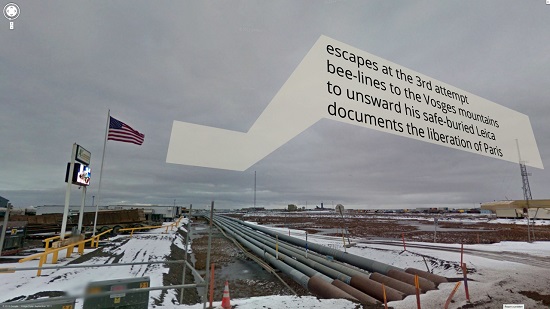Martin Jackson is writing a novel live on the internet. For the past few months, he has allowed anyone to open his Google Docs file where they can watch the novel – about a drone attack on London – grow, and add their own comments.
Where most writers keep their working process private, presenting a finished book after innumerable revisions, visitors to Jackson’s novel-in-progress are able to see the story changing, to give suggestions and to point out mistakes – although they can’t edit the text itself. For example, the novel is currently unnamed but readers have been giving suggestions for the title, from the generic thriller-style Broken Skies to titles made entirely of Emoji. Jackson, who has worked for years in advertising, playfully suggests that, for a PayPal donation, he could insert funders or products into the story (“I don’t see why a novel or the hallowed literary world should be immune from that type of thing”). He is experimenting with the boundaries of a novel when technology allows immediate interaction with readers: the possibilities of the internet are being exploited not just in allowing people to watch the multi-layered story develop, but also in the inclusion in the text of links and pictures such as Google Street View screengrabs.
Jackson is a poet who won the Eric Gregory award in 2011. Last year, he made himself writer-in-residence of Google Maps as an online poetry project funded by the Arts Council. He has also written what he describes as “one failed novel” (“it took me seven years to write and was incredibly painful to leave behind”) about graffiti and London. The same themes and concerns of that first novel and of his poetry – digital experience, surveillance, civil disobedience – are continued here. After more than a decade in London, Jackson now lives in Berlin but continues to write about the city he knows so well.
The novel-in-progress begins on the afternoon of Trooping the Colour, a moment of grand spectacle in Horse Guards Parade with thousands of horses and troops in bearskin hats celebrating the Queen’s official birthday. We meet characters on different sides of London and follow 32 drones taking off from the north, south, east and west of the city, laden with explosives, destined for Horse Guards Parade.
A few chapters in, the narrative structure is broken by the ‘writer’: suddenly declaring “shit, I’m out of battery”, readers realise that the person telling this story is sitting on a street in Hackney, writing on his laptop. The terror attack that’s been described has just happened and the protagonist (currently confusingly called ‘Martin Jackson’) decides to sit on the street, to not move for seven days and to write.
The structure of the book has been laid out over these seven days but, as readers can see when they open the document, only one day is fully written and even the first day is subject to change. Jackson expects the ambitious project will take at least two years to complete. He has spent a lot of time researching and ‘plotting’ (a word with double meaning in light of the subject matter) and the Google Document has been open since the spring but has so far mostly been circulated to friends.
Now it’s time for the next stage, when Jackson needs more nosy readers and sharp editors to get involved.
How did this ‘live’ novel-writing project come about?
Martin Jackson: There are two answers I guess. Firstly, there’s the novel itself, the drone-based terror attack of London. I’ve been wanting to write about that for two or three years. There’s a YouTube video that was my first ever glimpse of drones, and when I saw that I thought ‘this is a kind of technology that I’ve never seen before and it isn’t like anything else’ and I knew that at some point I wanted to write about it. Then the Google Maps poetry project and other things came along but it’s been bubbling away.
Then there’s the Google Docs side, and that came about specifically last summer, when I was copywriting for Soundcloud and they made me work in Google Docs. I’d never used it before and I hated it to start with – copywriters are quite precious about their work. I had a lawyer in New York and a business guy in Boston and someone else, and I could see them deleting my words and editing my stuff and thought ‘this is horrible’. But then I got over my ego and realised that it was actually really fascinating. When you’re looking at this document, you can see other people’s cursors moving up and down and you can almost see their thought processes. You can see someone go across a sentence and then back, or highlight something then un-highlight it.
Then I put the drone idea and the Google Docs thing together.

Does plot of the book particularly lend itself to what you’re doing with this collaborative, public format?
MJ: Yes, he [character in book] is doing exactly what I [the original Martin Jackson] am doing. He is writing in Google Docs. He’s going through the same process of deciding to make it public that I went through. My experience of working on it is fuelling what I write. As I’m finding out how weird it is to be writing publicly, I’m putting these things into the story.
He’s walking to work at 2pm and the bombs have gone off at midday. He’s learned about the attack and sat down and started writing about it straight away; there are helicopters in the air and a lot of madness happening. He basically decides to fictionalise what is happening – through following a Guardian live blog, watching the BBC stream, he’s learning about the attack and as he’s learning about it he’s instantly narrativising it. Within that strand of the narrative there is an awareness that he won’t be able to get it all done and he will need to go back and revise and that process of revision is laid bare. He says at certain points ‘come back to this’ ‘fix this’, so while we are reading chapter one in a longer format, while he is sitting on the street it would have been in a much shorter note format.
One of the things that I would quite like is that by day three or four, if the London that he is existing in were to start paying attention to what he is doing. I have the idea that someone like the Daily Mail will be like ‘this is outrageous, this guy is fictionalising this terrible event’.
Has the project been developing in any unexpected ways since you opened it to the public?
MJ: One of the things that has been the most interesting to me is the idea of performance. I didn’t realise how much I’d been affected by the presence of people in the document. A few weeks ago I was working on it at 10pm and was just about to log off when suddenly the icons in the top corner went ‘ping ping ping’ showing me that about 20 people had logged on because a friend had mentioned it on twitter. I then couldn’t stop working on it, I had to perform! I thought there would be more of a passive interaction with the people reading but it’s actually really interactive. You can see people’s cursors moving, when they pause on something, when they are considering something, so it does feel really public and I hadn’t expected that.
Another thing I’ve learned is that, as I was agreeing with people, I was knocking their comments off and making them disappear. But now I’ve decided that I’m going to leave them as it shows people what has been happening. It’s nice seeing the dialogue.
What is really nice is that while the majority of people have a cursory look and consume a little bit, a couple of people, like this person ‘Charlie’, I’ve no idea who he or she is [the majority of visitors are anonymous but if you’re logged into Google on Chrome or Gmail it will recognise you], have really been thorough and left lots of comments.
Can you tell me about your character ‘Robinson’ and the idea of ‘Robinson’ in literary history?
MJ: I have been fascinated with Robinson for many years. I’ve seen Patrick Keiller’s film London maybe 60 times; I used to go to sleep watching it. It was him that got me into Robinson as literary trope: starting with Defoe’s Robinson Crusoe, then you have the reappearance in Marx and Louis Ferdinand Celine, and a novel called Robinson by Chris Petit. There are also Keiller’s other films, Robinson in Space and Robinson in Ruins, Weldon Kee’s and Derek Walcott’s poetry, and JM Coetzee’s Foe. Robinson is almost always highly intelligent and manipulative, not a good person, a gadabout or a dandy, a person who struggles with structures and traditional ways of life who tries to change things. It’s fascinating to see the character re-emerge and change over centuries of literature and film.
When I found Robinson in literary history, I wanted to write my own. My Robinson, a woman, is the bomber sending the drones. I like the idea of Robinson contacting the writer on the pavement.
What are you hoping for readers of the doc-in-progress to contribute?
MJ: The structure is plotted but I haven’t written it all. So for example, I know that in chapter nine the east drones will take off from Hackney Wick and end up in Horse Guards Parade but I’ve got no idea what else happens. One thing I might do is farm out chapters. For example, I might give one to a graphic novelist, or an illustrator or a poet.
I also want help with research. I know a bit about drones but not a huge amount so it would be great if someone with specialist knowledge was able to contribute – ‘this type of drone would be to be able to carry this amount of weight’ – or someone with an army background might be able to tell me the how they would react, if they would try to protect the Queen. I also want editorial comments: does this sound good, does this sound weird, am I overusing adjectives, am I under using speech marks.
I’m looking for more people to get reading. I hope that as more people look at it there might be people following regularly. The more comments and ideas the better. Someone could suggest an idea to change the structure or someone could go off and write a chapter and send it to me.
One of the things I’m finding really interesting is this sense of being on show. So I’ve translated that into not just writing in public online but by taking my bodily self somewhere public. I’ve done a couple of trials saying ‘I’m going to be writing in this cafe so you can come and look at me physically but also online, in the document’. I’m reflecting what the narrator is doing sitting on the pavement: turning myself into a spectacle.
Amy Liptrot‘s first book, The Outrun, a memoir, will be published in the UK by Canongate in January 2016. She lives in Berlin



